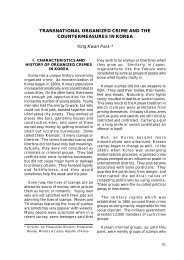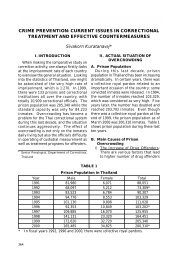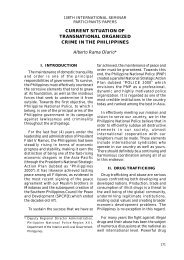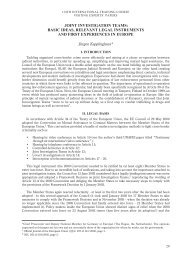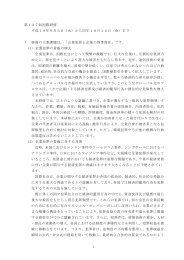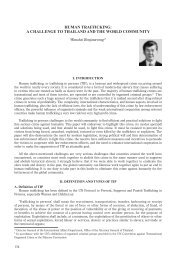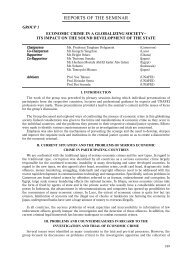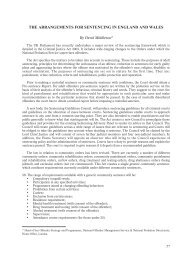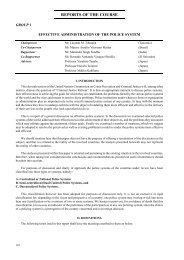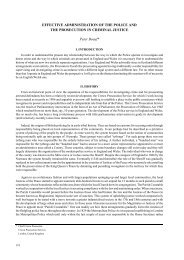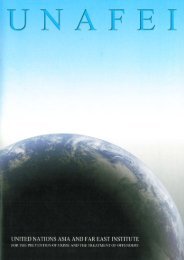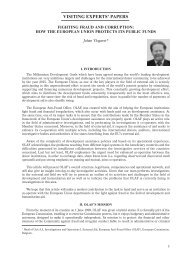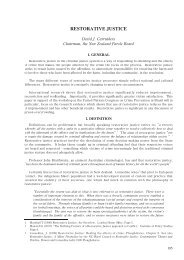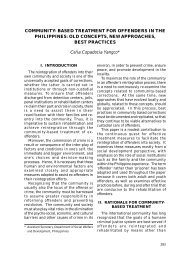CANADA'S ANTI-MONEY LAUNDERING REGIME Daniel P. Murphy *
CANADA'S ANTI-MONEY LAUNDERING REGIME Daniel P. Murphy *
CANADA'S ANTI-MONEY LAUNDERING REGIME Daniel P. Murphy *
You also want an ePaper? Increase the reach of your titles
YUMPU automatically turns print PDFs into web optimized ePapers that Google loves.
117TH INTERNATIONAL SEMINARVISITING EXPERTS’ PAPERSamount of investigative and prosecutionresources you propose to put against theissue. It should not become an overarchingissue since such figures are impossible toprove and as difficult to justify. The simplefact is that criminals launder their profitsof crime to defeat a state’s attempt to seizethose profits. I suggest that the magnitudeissue is less relevant to a betterappreciation of the approaches States cantake to the money laundering problem.Naturally, this assumes that countriesagree that money laundering is a criminaljustice issue.There have been numerous studies onthe harm to national economies and theglobal financial system as a result of moneylaundering. 7 I do not intend to discuss themagnitude of money laundering issue. Itake the phenomenon as a truism and themagnitude issue is less important than theability to investigate and prosecute (civillyor criminally). In Canada’s case we haveelected to investigate and prosecute moneylaundering under our criminal law. 8Criminals will move their criminal profits,abuse the financial system and ignorenational laws because they are criminals.Anyone who sells deadly drugs, illegally,5 The initial impetus for criminal forfeitures, at theinternational level, can be found in the 1988 ViennaConvention against Illicit Traffic in Narcotic Drugsand Psychotropic Substances. Pressure to expandbeyond a drug based attack against criminal profitsdeveloped in the 1985 Milan Plan of Action (i.e. aPlan adopted by the Seventh United NationsCongress on the Prevention of Crime and theTreatment of Offenders) and the 1994 NaplesPolitical Declaration and Global Action Plan. TheNaples meeting was the precursor to the very recentUnited Nations Convention against TransnationalOrganized Crime.The Financial Action Task Force [(see: http://www.oecd.org/fatf/index.htm), an internationalbody that emerged from an initiative of the 1989G7 Summit, as well as the growth of regional FATFtype bodies (such as the Asia/Pacific Group onMoney Laundering (APG) (see: http://www.oecd.org/fatf/Ctry-orgpages/org-apg_en.htm) and theCaribbean Financial Action Task Force (CFATF)(see: http://www.oecd.org/fatf/Ctry-orgpages/orgcfatf_en.htm)]advocated a broadly based moneylaundering provision. This is the clear intent ofthe FATF’s Recommendation 4. It reads as follows:Each country should take such measures as maybe necessary, including legislative ones, to enableit to criminalise money laundering as set forthin the Vienna Convention. Each country shouldextend the offence of drug money laundering toone based on serious offences. Each countrywould determine which serious crimes would bedesignated as money laundering predicate offences.6 In 1892 Canada abolished the common law’shistoric ability to forfeit upon conviction for a felony.The 1892 Code prohibited “any attaindre orcorruption of blood, or any forfeiture or escheat”but it retained the ability to forfeit as part of asentence. Until 1989 forfeitures were reserved tospecified things (e.g. guns, explosives) and offences.The new provisions implemented the 1988 ViennaConventions requirements, expanded the conceptto the listed enterprise crimes and created acriminal offence of money laundering.7 The Basel Committee on Banking Supervision (seehttp://www.bis.org/ ) developed the “Core Principlesfor Effective Banking Supervision” (see: http://www.bis.org/publ/bcbs30a.pdf ). In addition, theBasel Committee’s study on “Prevention of CriminalUse of the Banking System for the purpose of Money-Laundering” (see: http://www.oecd.org/fatf/pdf/basle1988_en.pdf ) illustrates the financialcommunity’s concern with money laundering.Similar concerns can be seen in the securities andinvestment sector (see the InternationalOrganisation of Securities Commissions’ CorePrinciples, at http://risk.ifci.ch/144440.htm), andthe insurance sector, where various principles andstandards of the International Association ofInsurance Supervisors (IAIS) and the OffshoreGroup of Insurance Supervisors consider moneylaundering issues287



